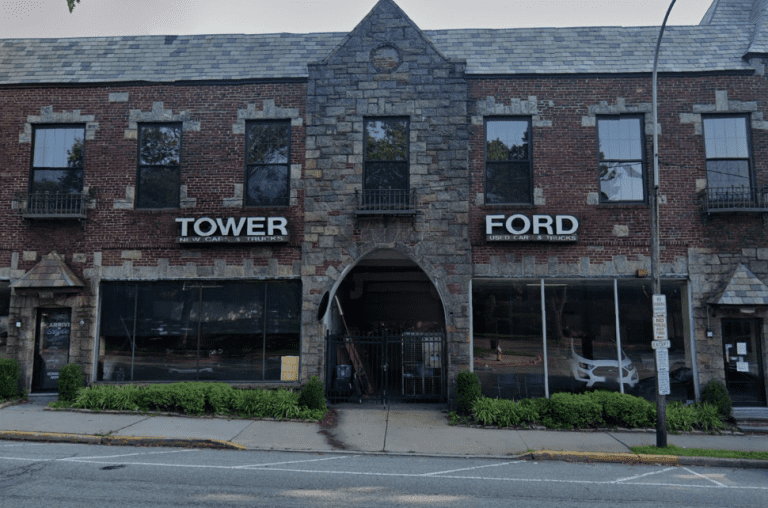The Village of Thomaston Landmark Commission approved a motion to hire the consultant services of Archaeology & Historic Resource Services to help determine if the Tower Ford building deserves to be deemed a landmark.
The commission, which held a virtual meeting attended by more than 40 members of the public on Tuesday night, unanimously approved the motion with a caveat that the consultant’s fee would not exceed $6,000. The motion was made as a recommendation to the village’s Board of Trustees, which can either accept, reject or modify the recommendation, according to village Attorney A. Thomas Levin.
The property has been a hot topic throughout the village after plans were submitted, and subsequently withdrawn, to develop a five-story apartment complex on the site of the Tower Ford building, located at 124 South Middle Neck Road, earlier this year.
Members of the commission include Chairman Donald Stern, Gary Noren, Karen Siegel, Leila Mattson and Miriam Chatinover. Mattson, the village historian, said she was hesitant to have the village pay for a consultant for something she believes is “a straightforward choice” in determining its landmark status.
“This is a building that was built just about the time that the village was incorporated, and has interesting architecture,” Mattson said. “I mean, it’s a pretty straightforward choice here and I don’t understand why we’re going through all this complicated situation.”
Stern said he believes that a consultancy should be hired since the determination of what can be deemed a “landmark” differs from a structure that is “historical.”
“I think something more is necessary than just meeting the definition before this commission should designate a building as a landmark,” Stern said. “I would think relevant factors would be things such as the significance of historical connection, the impact of the community and its sense of history, if the structure were to be changed or demolished, the impact on the community if the structure was not changed, and possibly other factors.”
The state’s Department of Parks, Recreation and Historic Preservation declared the site eligible to be considered as a historic place on Oct. 29.
Members of the public, who were able to voice their opinions during a comment session prior to the board’s decision, urged the board to listen to other residents with historical knowledge of the village and its buildings. Residents said they appreciated the chance to be heard and pleaded for transparency throughout the process, citing previous negative experiences with the Board of Trustees.
Stern made it clear that while he does not want matters of the commission pertaining to this property to linger on for some time, the commission should not and will not move things forward for the sake of just moving the process along. Public input at subsequent hearings, he said, is also strongly encouraged and residents with any information they feel pertinent to share should feel free to do so.
The commission also unanimously approved a motion to set a date of Jan. 4 at 7:30 p.m. to conduct a public hearing on whether the property should be designated as a landmark.
Once public hearings are officially concluded, the commission will have 60 days to make a recommendation on the property’s landmark status. Levin said the “clock does not start” for the 60-day deadline until the hearings have concluded, which could potentially extend beyond the scheduled Jan. 4 meeting.
Village officials scheduled a Dec. 20 public hearing to repeal a local zoning law that was set in place earlier this year relating to the proposed apartment.
The law was passed during a July meeting and, along with the proposal, has been heavily criticized by the public. The law allows the Board of Trustees to have “sole and unfettered discretion” on what conditions and incentive use permit may be granted to certain applicants. The new law applies to applicants that have a property located partially in the Apartment B and Residence 10 zoning districts, a total area of at least 0.75 acres but not exceeding one acre, a depth at its greatest point of at least 200 feet and street frontage on Middle Neck Road of at least 230 feet.
The property at 124 S. Middle Neck Road lies partly in the Apartment B and Residence 10 zoning districts, has a total area of 0.96 acres, and has a depth of 234 feet, according to village documents.
Village officials announced several weeks ago that the application was withdrawn by the applicant, 124 Middle Neck Realty LLC, after the applicant did not send out the required legal notice for a previously scheduled public hearing on the proposal and did not pay a $25,000 deposit to the village for an engineering consulting firm. Officials also said the applicant intends to modify the proposal.



